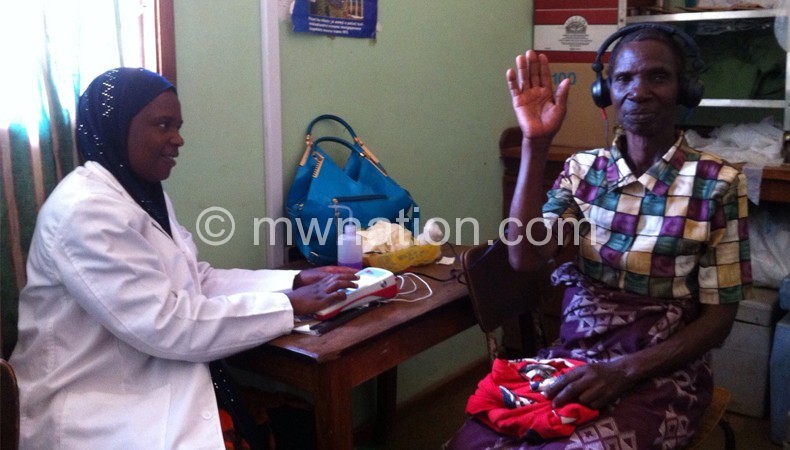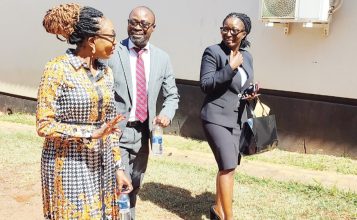Big Interview: Mwanaisha Jauza Phiri
Mwanaisha Jauza Phiri is an audiological officer at the Queen Elizabeth Central Hospital. The former nurse went into audiology by mistake, but is now part of those helping many with hearing problems.
————————————–
What inspired you to study audiology?
Nothing inspired me to study audiology, it just came as an opportunity or else I can say it was God’s call to the profession because I never thought about training as an audiologist. I did not have any idea about the course.
How did you find yourself in such a profession?

Professionally, I was trained as a nurse and midwife technician at Holy Family College of Nursing from 2004 to 2007. Following my graduation, I worked as a theatre nurse at Queen Elizabeth Central Hospital (QECH) in the main operating theatre for four years. Thereafter, in 2011, I was shifted to the out-patient department which is called the adult emergency and trauma centre (AETC) where I worked for only ten months.
In the same year, one of the senior nursing officers informed me about a scholarship for a diploma course in clinical audiology and public health otology at the University of Nairobi and encouraged me to apply. I applied and fortunately I was offered the scholarship. I was happy with the scholarship even though by then I had no idea about the contents of the course. I left for Nairobi in 2012 and returned home in 2013 following a one year diploma course in audiology. I was sponsored by well-wishers known as the sound seekers, a UK based organisation through QECH. While at the university, that’s where I got to know what is involved in audiology and was very happy to be helping those with a hidden disability –the hearing impairment.
How do you manage your time?
Every day, I wake up as early as 4.30am, take a bath, pray an Islamic morning prayer, prepare my breakfast and my children for school. I leave home at 7am and knock off at 5pm.
How many women are in the same field in Malawi? And perhaps in Africa or the world?
In Malawi, so far we have two Malawian women who were trained at the University of Nairobi and got diplomas in audiology, myself and Prisca Kalinde Chipao. We are both working at QECH’s earn nose and throat (ENT) department, audiology centre. The other three Malawian women I know in the same field are those who were trained on the job at African Bible College hearing and training centre in Lilongwe and are currently working there.
Would you describe audiology as male dominated?
I never had an experience in a field dominated by men because at first I was working as a nurse which is a women dominated field and the same applies to audiology, evidenced by a group of visiting American student audiologists with their tutors who came to QECH in June to provide us with audiological services who were almost twenty in total, but were all female. At QECH, we are three of us practising audiology myself, including a senior doctor in audiology, an American volunteer (Dr Courtney Caron) and one man Louis Jailosi.
What are the discrepancies from what your learnt in college compared to what you do on the job?
So far, we do not have a sound proof room and other equipment like visual reinforcement audiometer, auditory brain stem response diagnostic audiometer and videonystagmography— a machine for balance assessment. But in Nairobi, we used to have the afore-mentioned equipments.
However, there is hope for improvement. The sound-seekers have promised to build a well –equipped audiology department of European standards at QECH expected to be complete by next year 2015. That is to enable me and my colleagues work in a conducive environment with at least enough resources.
Despite limited resources, we are able to offer the following services at QECH; hearing assessment, hearing aids fitting, cerumen (wax) management, tinnitus counselling, balance assessment and management, ear impression taking and outreach programmes.
Please tell me about your family?
I am a third born child in a family of four children. I have two older sisters and one young brother who is doing his studies in business administration. I am a Muslim and a yao by tribe.
I am 35years old married with four children, two boys and two girls. My husband is a police officer working at Blantyre Police Station. I was born in Zimbabwe where my father was working.
What is your education background?
I attended my junior primary school in Zimbabwe from classes one to four. Thereafter, I came back to my home country, Malawi in 1991 and continued my junior primary school classes at Lusalumwe Primary School, in Namwera, Mangochi.
From Standard Six to Eight, I went to Kwilembe Primary School and from there; I was selected to Lisumbwi Secondary School in Monkey Bay, Mangochi in 1995. I completed my secondary school in 1999. By then, I was fortunate enough because the Malawi government had introduced free secondary school education for girls. It was the same time I lost my mother who used to knit different materials to sell for an income to support me because my father re-married and went back to Zimbabwe where I could hardly reach him.
How is diagnosis like in terms of resources and people’s knowledge?
Due to the limited resources, especially those that help us diagnose hearing loss in a hyperactive or autistic child, it is not easy to come up with a diagnosis. We have to refer them to other clinics that are well equipped.
What special contribution have you done that moved decision makers?
So far, I have done nothing that has moved decision makers.
What is your advice to women?
Being a married woman does not mean you should die a house wife. Chances are, there can be a successful in life while also managing a family. I stayed as a house wife for four years and then later managed to do my diploma in nursing while in marriage and managed to do another diploma in clinical audiology; and public health otology in Kenya at the University of Nairobi leaving my children with my husband. What is needed is to ask God for guidance and discuss with your partner about the benefits of furthering in education. I am still not satisfied with my qualifications and I wish to study audiology up to a master’s level.
Any last comments?
Life is not easy. There is a need for hard work to overcome challenges, persevere and seek God’s guidance. Everything is possible with God.
Virtous Woman
Honesty—pathway to holiness, key to relationship (3)
I ended up my article last week by issuing a warning that we should steer clear of landmines – but what exactly is your description of a landmine and how does this link to the issue of honesty? A landmine is always buried underneath, only when someone steps on the it does it explode.
Virtuous woman, pause for a moment and think through the reality of the above sentences. They literally describe us: pressure applied to ‘land mines’ of unresolved issues such as hurt, fear, or insecurity trigger explosions of our emotions. The eruption is usually expressed outwardly resulting in angry interchange. But it can also be an inward, causing icy withdrawal from conversations.
Recently, I was in the company of two friends. One of them, Lucy (not her real name), had a terrible day. She was struggling with a rebellious teenager in her home. Like all mothers to teenagers, she was also grappling with feelings of guilt over the way she handled a confrontation that very morning and you could feel the emotional struggles wearing her out.
On the other hand, my other friend Tawonga was also having a bad day. She had encountered conflict with her husband as well as another friend earlier in the week and was feeling isolated. She felt that whenever she said something, she was misinterpreted and ultimately rejected. She too had emotional, yet undetected outside!
Lucy sharedher situation at home, to which Tawonga innocently offered suggestions on how to deal with her teenager. Lucy reacted defensively and became angry. Tawonga also responded in anger towards Lucy. The issue was not so much about comments made by the other person, as much as it was the feelings by each of them that brought about the explosion as they both stepped on each other’s landmines.
Sadly, most of the victims of landmine explosion have been innocent by-standers! Let’s talk more about this next week.





